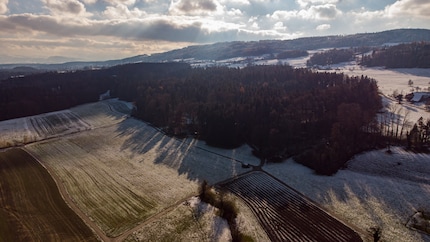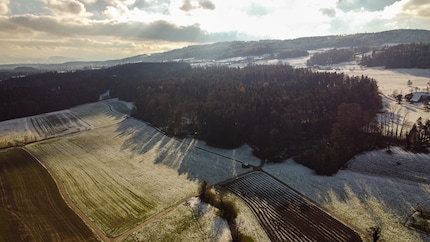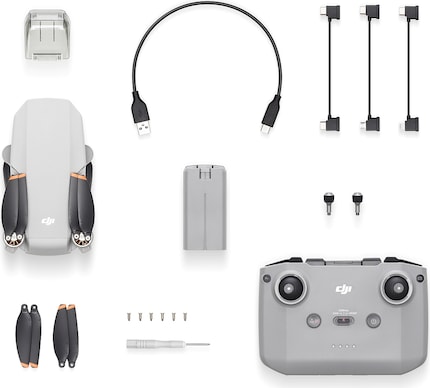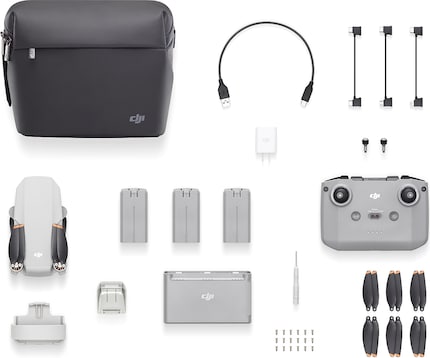

DJI Mini 2: convincing, but with a live stream problem
The DJI Mini 2 makes superb 4K videos and high-quality photos thanks to the DNG format. The quality of the live stream was also supposed to be much better than that of its predecessor, but I was disappointed. I'm still not sure why.
Although I've had the DJI Mini 2 with me for several weeks, I haven't used it much; the fault lies with the disastrous live stream for a long time on the smartphone. The frame rate sometimes dropped to 1 fps, with major image distortions. See for yourself:
What the drone recorded on the SD card was flawless. Only, the live image was so jerky that I could never tell if I was executing the movements correctly. As a result, only shots where the drone was flying slowly straight ahead or remaining static were usable.
Problem solved, but still not perfect
The connection between the drone and the remote control should, thanks to OcuSync 2.0 be much more stable, have more range and offer a much smoother live image on the Mini 2. So I had to clarify why this isn't the case.
DJI has provided firmware updates for the remote and even the battery, but not for the drone. The problem remains. I emptied the smartphone's RAM, created more space for videos, and rebooted it. Nothing helped.
After deleting and reinstalling the DJI Fly app, everything worked much better, but still not perfectly. The live image was now smooth enough for safe navigation, but not good enough for a final video. This is in contrast to the DJI Mavic 2.
Even when I used another, more powerful smartphone to fly, nothing changed: the Xiaomi Black Shark with 8GB of RAM and Snapdragon 845. Regardless of the phone, the live image isn't as good as with the Mavic Air 2, despite OcuSync 2.0.
Here's a short sequence, first with the live image saved on the phone, then with the original drone recording on the microSD card. Basically, the latter would be even better, but I had to downscale the 4K format to Full HD for comparison. The live image is 720p, but that's not the problem; it's the objects.
I'm currently still in contact with DJI to find out if this quality is normal or if it's a problem specific to my equipment.
The drone in brief
Although I couldn't really test it, let's talk about the drone. In general, it flies very safely and pleasantly. The rotation and tilt speeds can be set individually for each flight mode. The drone doesn't make much noise, and you can't hear it after just a few metres. The gimbal compensates for these movements, even though the drone oscillates in light gusts of wind; the light wind is not visible on the videos. So far, I haven't flown in strong winds.
Image quality is somewhere between that of the DJI Mini and the Mavic Air 2. The Mavic Air 2 has a resolution of 48 megapixels and combines four pixels at a time to improve dynamic range. This enables it to better reproduce large differences in brightness. The DJI Mini doesn't have this feature, but it's still much better than its predecessor. This is largely due to the fact that the Mini 2 is able to use the RAW format, or more precisely the DNG format similar to RAW. Here's a direct comparison with shooting in JPEG. You can clearly see the benefits, especially when it comes to the sky.


By the way, the Mini 2 can also do exposure bracketing to handle high contrasts. But I haven't tested it.
I really like the Fly-More kit and would definitely recommend it, even though it's considerably more expensive. It not only provides two extra batteries and more spares for a trouble-free flight, but also a great charger. It can charge three batteries at once and recognises which battery still has the most power and charges it first. What's more, the kit also includes a handy bag and carrying loop.


The 4K
The DJI Mini 2 has mastered 4K. And in good quality too; videos are crisp and look great on a 4K screen. However, if you want to enjoy it, you also need the right equipment. This includes not only a 4K screen, but also a powerful computer.
With drone videos, it's important to see a smooth sequence of movements in the preview, otherwise you won't be able to edit accurately. So having a computer that just barely supports 4K isn't enough; it has to get there "fingers in the air".
My three-year-old work laptop is completely out of date. So is my PC, which is five years old. It's ready for the scrap heap and will be replaced by a Mac Mini with an M1 chip. From what I hear, it has outstanding video editing capabilities even with a minimal configuration.
Summary
The live image isn't as good as I thought it would be; with this quality, it's not a backup option in case the SD card is full or has been forgotten. Apart from that, I like everything about the DJI Mini 2. Despite its small size, it flies steadily and has the same battery life as the big drones. The quality of photos and videos isn't quite comparable to that of the Mavic Air 2, but it's clearly superior to that of the Mavic Mini.
Who is this drone aimed at? It's often seen as an inexpensive entry-level device, which isn't entirely true. To get the most out of it, you'll need the not-so-cheap Fly-More combo and a computer for which 4K isn't a challenge. What's more, the DJI Mini 2 only has obstacle detection on the underside. So it doesn't prevent you from crashing into a tree; that's up to you. But if that doesn't scare you, you'll love the DJI Mini 2. Even when your demands for image quality increase.
My interest in IT and writing landed me in tech journalism early on (2000). I want to know how we can use technology without being used. Outside of the office, I’m a keen musician who makes up for lacking talent with excessive enthusiasm.



